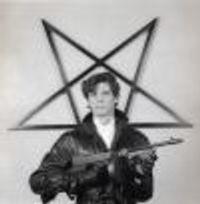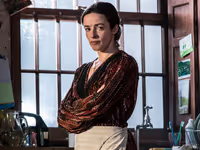MERRILY WE ROLL ALONG First Performance...
#175MERRILY WE ROLL ALONG First Performance - I was at the dress..
Posted: 2/16/12 at 12:10pmSonof, I see what you are saying. I guess I didn't feel that way because I knew the show was going backwards and I would find out what made them that way.
#176MERRILY WE ROLL ALONG First Performance - I was at the dress..
Posted: 2/16/12 at 12:15pm
Let me also state that I actually didn't really feel that way. I was very much engaged with the show from the beginning. But my engagement for all of Act 1 was mostly cerebral. I wanted to know how the pieces of the puzzle fit together. When it began to click in Act 2, I found the emotional pay-off extraordinary. I wonder just how much of the theatregoing public would want to expend their energy like that.
I also want to reiterate what a fan I was of having the three principals meet on the roof. I know some feel that something was lost, but, as I don't have any previous experience with the original book, I thought it worked like gangbusters.
#177MERRILY WE ROLL ALONG First Performance - I was at the dress..
Posted: 2/16/12 at 12:36pm
Like I said, it's hardly the first show that asks an audience to take their time watching character development in a slightly unusual way; off the top of my head, I can come up with Pinter's Betrayal, Stoppard's Artist Descending A Staircase, and Ayckbourn's Time of My Life.
There may be many audiences who don't like to keep their brains turned on while watching a show, but Merrily was never for them anyway.
My biggest problem with Merrily is that most audiences forget what they've seen prior to the point in Act II when the characters become even remotely sympathetic, and leave the theatre remembering only the cute kids with stars (and Sputnik) in their eyes, forgetting the cautionary tale about being seduced by bad decisions.
Updated On: 2/16/12 at 12:36 PM
#178MERRILY WE ROLL ALONG First Performance - I was at the dress..
Posted: 2/16/12 at 12:43pm
"My biggest problem with Merrily is that most audiences forget what they've seen prior to the point in Act II when the characters become even remotely sympathetic, and leave the theatre remembering only the cute kids with stars (and Sputnik) in their eyes, forgetting the cautionary tale about being seduced by bad decisions."
Well...that's exactly what I was talking about, stated in a different way. No...I don't think the device used to tell the story is all that taxing. It's the what you say above...most of the evening is spent on characters that have become disillusioned and are thus hard to root for. But the pay-off, for those who take the journey, is extraordinary.
I also forgot entirely (until she started singing) that the answer Beth gives Frank when he asks 'Do you still love me' during the last scene of Act One is actually their wedding vows. It was extremely powerful...but only cause I knew it (and had forgettn it) going in.
#179MERRILY WE ROLL ALONG First Performance - I was at the dress..
Posted: 2/16/12 at 1:29pmSonof, I agree with beth's answer. Quite powerful. I was also wondering if in the original, the young son came out and sang when he did. That just brought instant tears to my eyes.
Phyllis Rogers Stone
Broadway Legend Joined: 9/16/07
#180MERRILY WE ROLL ALONG First Performance - I was at the dress..
Posted: 2/16/12 at 1:31pmI don't believe there were any children in the original production, not counting the teens in the cast.
#181MERRILY WE ROLL ALONG First Performance - I was at the dress..
Posted: 2/16/12 at 1:35pm
I don't remember seeing any in the pictures from the original production. Didn't look to see if they used one in the revised. But it was a great touch.
Also, Phyllis, I thought of you and your post about not being able to see the show with the character you named Kringas after. It isn't much but I grabbed a playbill for you. If you want it, msg me over on the other site and I will mail it to you.
Phyllis Rogers Stone
Broadway Legend Joined: 9/16/07
#182MERRILY WE ROLL ALONG First Performance - I was at the dress..
Posted: 2/16/12 at 1:41pm
Sweet! I'd love it. Thanks!
The Young Frank sings in the first act in this version, right? I'm pretty sure on the York recording he sings in the second act in the transition before Opening Doors.
#183MERRILY WE ROLL ALONG First Performance - I was at the dress..
Posted: 2/16/12 at 1:52pm
I just looked at the Playbill and he is not listed as singing so I can't remember when it happened, I am wondering if they didn't list it so you didn't see it coming? It kind of took the audience by surprise and you could feel the emotional impact it had.
Edited!
#184MERRILY WE ROLL ALONG First Performance - I was at the dress..
Posted: 2/16/12 at 2:04pmIn the current production, Frank Jr. sings it after spying Frank and Gussie making out in his apartment the day he returns from the cruise. I'm pretty sure it's in the first act.
#185MERRILY WE ROLL ALONG First Performance - I was at the dress..
Posted: 2/16/12 at 2:09pmYes. First Act...right after Old Friends/Growing Up sequence.
#186MERRILY WE ROLL ALONG First Performance - I was at the dress..
Posted: 2/16/12 at 4:45pm
Thanks so much Kad- that's a really good company of actors.
I do actually love the idea of Frank Jr. singing a transition after the Old Friends/Growing Up scene- I'm not crazy about all of the changes (admittedly having not seen them) but that sounds like a really touching moment.
#187MERRILY WE ROLL ALONG First Performance - I was at the dress..
Posted: 2/17/12 at 5:43am
Frank Jr to the best of my knowledge has been in all the revised versions--and not the original.
I get the argument that Not a Day Goes By the first (chronologically second) time seems liek a nowhere song for a character nobody knows, but that was the very point of course--that while in a way it's a reprise of an earlier song, Sondheim and crew wanted the poignancy of the first time to finallyr egister when the song is repeated. It's a hard thing to sell, and maybe doesn't ultimately work-=-as others said you really do have to be paying attention (and if you're new to the show, even that can be hard).
#188MERRILY WE ROLL ALONG First Performance - I was at the dress..
Posted: 2/17/12 at 5:51am
SonOfR said: "POILERS POSSIBLE: Once Frank and the his friend snorted coke on the yacht, I wondered why they idea of coke wasn't introduced earlier (later?) for the character of Frank. Maybe it is a bit of crass shorthand for 'man who's lost his way', but I think it could have worked well (especially in That Frank and leading into Franklin Shepherd Inc.). "
In the original production there are great, exagerated lines of coke done I believe on beat during Rich and Happy. (Keep in mind the original production, and especially that number--the opening of the "story" songs--was done in a more exagerated fashion due to the conceit of students re-enacting his life). I swear one production of the revised version I saw had more secretive coke use during That Frank which would seem to make sense.
#189MERRILY WE ROLL ALONG First Performance - I was at the dress..
Posted: 2/17/12 at 9:25am
Having the little boy sing is very touching--much more touching than having a little boy sing "Somewhere" in West Side--but I'm afraid none of the changes in the script actually fix what was wrong the first time: Frank is an asshole and not even an interesting asshole.
Creating the character of a son who won't speak to him--and then showing him as a little boy seeing his father in a passionate embrace with the woman who is breaking up their home--this just makes Frank that much more of a cad.
Same goes for beefing up the storyline of his affair/marriage/divorce with Gussie: None of that involves us more in his story. It all just makes him more uninvolving.
It's like they took what was wrong with the original and "fixed" it and made it worse.
George in Sunday in the Park is selfish and obsessed, but "Finishing the Hat" and other songs draw us in and involve us in his obsession and its underlying loneliness.
Somehow, Sondheim never got around to writing a "Finishing the Song" for Frank.
#189MERRILY WE ROLL ALONG First Performance - I was at the dress..
Posted: 2/17/12 at 10:12am
EricMontreal, I understand your point. I was a first time audience member for Merrily, and while I understand how Not a Day Goes By works on paper, it just didn't work. I heard many audience members around me discussing it at intermission. Many were asking why Mary doesn't sing the song. They knew going in that it was Sondheim's lone standard in the show, and they were pretty confused as to the choice of presentation of the song.
In fact, in the second act reprise, I didn't care about the other two, just Mary singing it. Maybe it's Celia's performance of it, but when the words come out of Mary, it completely makes sense. I also feel her being in love with Frank wasn't explored quite enough. Seems like in every episode, someone asks her about it, but that's it. It's not fully fleshed out, just a fact that they mention.
#190MERRILY WE ROLL ALONG First Performance - I was at the dress..
Posted: 2/17/12 at 10:23amJoey has it right - there's never been a moment in any version of this show when Frank was anything more than a boring moron.
#191MERRILY WE ROLL ALONG First Performance - I was at the dress..
Posted: 2/17/12 at 11:21am
I find Frank more likable as Act 2 progresses, obviously. By then, however, it's really too late. I understand Sondheim and Furth wanting to show someone's moral devolution and disillusionment, but like Joey points out, for all of act 1 we get a self-involved, greedy philanderer. "Growing Up" doesn't do enough to make him seem three dimensional. We don't really see how it affects him to be up to his neck in success but devoid of meaningful relationships.
In fact, Charley and Frank and Mary's friendship never feels particularly strong at any point. They have to sing a song about how much they're friends to illustrate that they are friends. But they don't act... friendly very much.
#192MERRILY WE ROLL ALONG First Performance - I was at the dress..
Posted: 2/17/12 at 7:23pmAm I only one who wants to see John Doyle's upcoming production of "Merrily We Roll Along" with Malcolm Gets and Becky Ann Baker?
#193MERRILY WE ROLL ALONG First Performance - I was at the dress..
Posted: 2/17/12 at 7:29pm
^ Yes.
Well I'm sure you're not. But a 60-year-old Mary is probably one of the most unappealing casting choices in a LONG time.
#194MERRILY WE ROLL ALONG First Performance - I was at the dress..
Posted: 2/18/12 at 4:00pm...especially if she has to lug around a bassoon while singing "Like It Was."
Owen22
Broadway Legend Joined: 2/24/11
#195MERRILY WE ROLL ALONG First Performance - I was at the dress..
Posted: 2/18/12 at 5:05pm
I'm not going to argue the basic merits and/or flaws of this, one of my favorite shows. Basically, all I can do is quote from that guy from Sondheim & Company: "Tt's still backwards".
BUT, I was appalled how horribly directed the Encores "Merrily" was. Awful. I can't even blame Celia's bad performance on her as she obviously got very little direction (she was also miscast). I can't tell if Lapine directed in micro so the macro was left undone (example: the pinkie clasp) or the other way around (example: the onstage change into the Hawaiian shirts). Was he just unaccustomed to that short a rehearsal time? I'm guessing he has never directed a staged reading before. Have all his shows gone directly to workshop? Cause he just didn't know how to do it. Did he spend all his time coming up with the scrapbook photo presentation?
#196MERRILY WE ROLL ALONG First Performance - I was at the dress..
Posted: 2/18/12 at 6:26pm
I just came back from seeing this, I absolutely loved it and thought it was Sondheim's best score and his best show I've ever seen. The cast was superb, everyone was great and no one was misscast.
The screen was a great idea, and the orchestra was fantastic.
The cast was a big surprise, Lin-Miranda was great.
Colin Donnell was fabulous, he truly did an amazing job. Top notch. But the real standout was Elizabeth Stanley, her number (the Act 2 opener) was perfection, it reflected the magic and glamour of Broadway.
5 stars out of 5. The best show of the year.
#198MERRILY WE ROLL ALONG First Performance - I was at the dress..
Posted: 2/19/12 at 12:02amSaw it this evening and thoroughly enjoyed it. I was very pleasantly surprised by Celia, though I suspect if they go to Broadway she'll get replaced.
Videos












